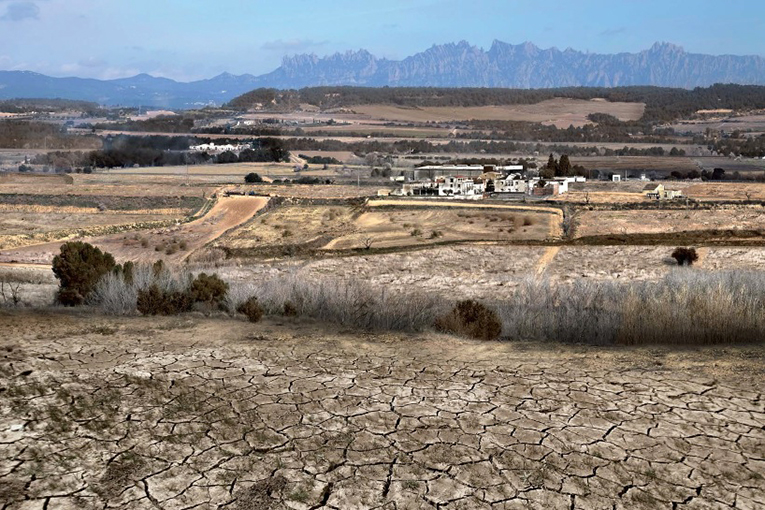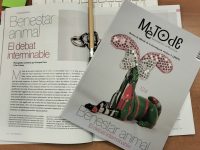
 Greenpeace/ Pedro Armestre i Mario Gómez Greenpeace/ Pedro Armestre i Mario GómezGreenpeace presented the report “Spain: Towards an extreme climate. Risks of not tackling climate change and the destruction of the Arctic“, in April 2014, which incorporated a gallery of photographic montages that recreate the possible effects of climate change in our country. In the picture, a simulation of Penedés vineyards affected by rising temperatures and water scarcity. |
||
|
From polar bear endangerment to the challenge of achieving low-carbon economies. Biodiversity loss and the forecast alteration of weather patterns focused the early warnings that global warming was caused by human emissions in the 1990’s. Two decades later, climate change ramifications reach different areas such as health or safety. However, its attempts to conquer the economic discourse are noteworthy, and so is the political and social complicity to integrate this phenomenon as an unquestionable priority. The weaknesses of the environmental narrative have become loopholes that distract and corner the relevance of climate change. Especially because environmentalist messages are not especially welcome. Not by a capitalist model –which jeopardises the alleged state of welfare we have reached thanks to a growing spiral of resource consumption and energy demand–nor by a well off society that is ethically self liberated from environmental responsibilities. Sensationalism and the remoteness of a phenomenon especially illustrated by the demolition of ice cathedrals at the Poles have influenced mainstream information on global warming. On the one hand, these environmental alarms arrived at a time of crisis for environmentalist callings, which was exacerbated by the rise of individualism in the developed world that is increasingly unconcerned over common goods such as nature. Meanwhile, the number of scientific reports by the United Nations grew –in 2014 the fourth one was published. These reports are developed concurrently with a profound transformation of the communicative paradigm in the global arena. The digital era not only wounded traditional journalism fatally, but it radically changed the rules of the diffusion of information. Web 2.0 environments have brought about great benefits for the circulation of environmental messages. But also disadvantages. A transmission marked by speed and immediacy, and also by the loss of the journalist role as intermediary and gatekeeper, in an environment in which the multiplication of transmitters and receivers endangers the quality of communication, it even destroys the traditional business model of the mass media. Social networks, despite their benefits, promote simple, flashy and fleeting messages, fact that collides with the dissemination of the complex scientific article, which deals with issues such as climate change. They also use attractive flashes that favour alarmism or the viral dissemination of contents with no scientific consensus that include the claims of climate change deniers. Among the many global summits and reports by the scientific community, climate change gives way to economic challenges to describe new growth paths in a context of technological innovation in order to overcome the cycle of crisis. From an apocalyptic phenomenon to a business opportunity. The report commissioned by the British government to economist Nicholas Stern already warned of the enormity of the economic side of it in 2006. This report urged an investment of 1% of the world’s GDP for relief in order to avoid a recession that could reach 20%. Thus, business and NGO initiatives are presented in order to transition towards low carbon societies while projects such as the cooperation project Climate –KIC are consolidated, the largest public-private European initiative on innovation, promoted by the European Institute of Innovation and Technology. The different areas affected by climate–Biodiversity, safety, health, economy, politics, and communication –should come together because they are complementary and enrich the dialogue to promote involvement and responsibility. Climate change is to be interpreted as a tool for economic recovery; the point is getting enough political and business support for the oncoming climate United Nations summit in Paris, scheduled for late 2015, when international commitments are to be renewed to firmly and boldly stop greenhouse emissions worldwide. Maria Josep Picó. Journalist and environmental communicator. Scientific Culture and Innovation UnitChair for Science Dissemination of the University of Valencia. |
«Environmentalist messages are not especially welcome. Not by a capitalist model nor by a well off society» «The different areas affected by climate–Biodiversity, safety, health, economy, politics, and communication –should come together because they are complementary and enrich the dialogue to promote involvement and responsibility»
|
|





